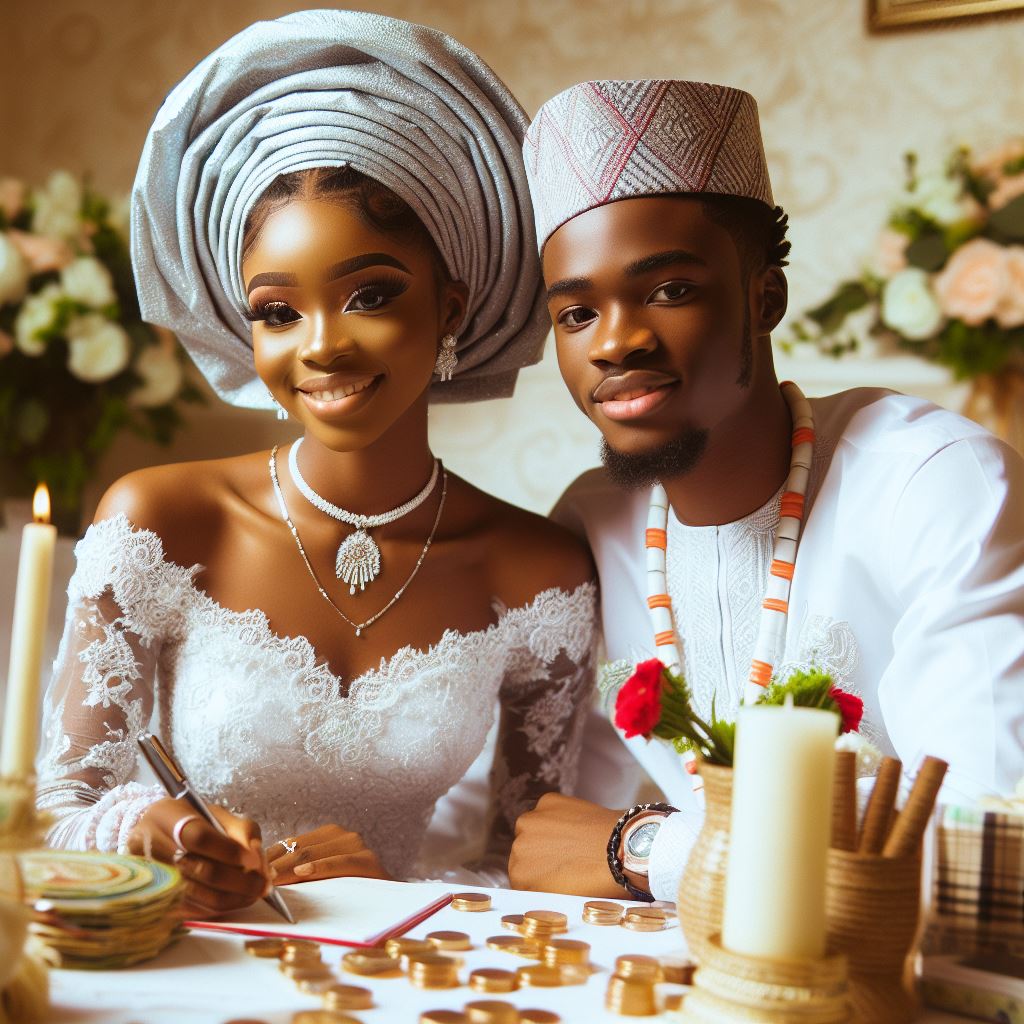Introduction
Nigerian weddings are renowned for their grandeur, vibrant celebrations, and cultural richness.
They are not just matrimonial ceremonies; they are a convergence of tradition, love, and social status.
However, beneath the dazzling display of colors and festivities lie hidden costs that often go unnoticed.
In this post, we will delve into the extravagant world of Nigerian weddings and uncover the financial burdens that accompany these joyous occasions.
Nigerian weddings are elaborate affairs, marked by a fusion of cultural traditions and modern trends.
The celebrations can span days and involve intricate rituals, lively music, and a profusion of sumptuous cuisines.
Family and community play pivotal roles, and the ceremonies serve as a symbol of unity, not just between the couple but also among their families.
Beyond the union of two individuals, these weddings hold immense cultural significance.
They are an opportunity to showcase familial affluence, strengthen social ties, and affirm one’s place in the community.
The larger-than-life nature of these events reflects the importance Nigerians place on family, community, and the institution of marriage.
The cost of a Nigerian wedding can be astronomical, often surpassing reasonable expectations.
From extravagant attire to elaborate decorations, and a lavish array of food, the expenses accumulate rapidly.
The pressure to outdo peers and maintain societal standards contributes to the inflation of these costs.
Hidden expenses emerge from the need to host multiple events, hire professional photographers, and satisfy cultural expectations, driving the overall expenditure to unprecedented levels.
As we journey through the pages of this post, we will uncover the concealed financial burdens that couples and their families bear in the pursuit of the perfect Nigerian wedding.
Your Personalized Financial Plan
Get expert financial advice tailored exclusively to your goals. Receive a custom roadmap in just 1-3 business days.
Get StartedBrace yourselves for a revealing exploration into the opulent world of these celebrations, where the hidden costs may surprise even the most seasoned observers.
Traditional Engagement
The traditional engagement ceremony in Nigerian weddings is a significant and elaborate affair that holds deep cultural significance.
It involves the formal introduction of the groom and his family to the bride’s family.
During this ceremony, both families come together to negotiate and finalize the terms of the union.
It is a time of celebration, union, and the exchange of gifts and items of value.
Hidden Costs Involved
While the traditional engagement ceremony is a beautiful and cherished event, it is essential to be aware of the hidden costs involved.
One of the predominant costs is the bride price.
The bride price is a sum of money or gifts paid by the groom’s family to the bride’s family as a show of appreciation and respect for raising their daughter.
This cost can vary significantly depending on the bride’s family and their expectations.
Additionally, ceremonial gifts are a crucial component of the traditional engagement.
These gifts, also known as “list,” are items requested by the bride’s family from the groom’s family.
It often includes items such as clothes, jewelry, and household goods.
Impact on Overall Wedding Budget
These hidden costs can have a significant impact on the overall wedding budget.
Many couples underestimate the expenses involved in the traditional engagement, resulting in financial strain.
Unlock a Debt-Free Future with Our Unique Strategies
Imagine a life unburdened by debt—a reality we help you visualize and achieve. We offer personalized strategies tailored to your unique situation, guiding you step-by-step toward financial freedom.
Start TodayFor example, if the bride price is particularly high or the ceremonial gifts are expensive, it can lead to a strain on the groom’s family’s finances.
This financial burden often extends to the wedding planning process as well.
In some cases, couples may need to adjust their budget, cut back on other wedding expenses, or even take loans to meet the demands of the traditional engagement ceremony.
Furthermore, the pressure to meet these expenses can add stress and tension to the families involved.
It may create expectations and obligations that can be difficult to fulfill, causing emotional strain on all parties.
The traditional engagement ceremony in Nigerian weddings is a beautiful celebration of love and culture.
However, it is vital to be aware of the hidden costs, such as the bride price and ceremonial gifts.
By understanding the potential financial impact of these expenses on the overall wedding budget, couples can make informed decisions and plan accordingly.
Communication and financial planning between both families are crucial to ensure a harmonious and stress-free wedding celebration.
Ultimately, embracing the traditions and customs of a Nigerian wedding while also managing the hidden costs can lead to a memorable and joyous celebration of love and family.
Read: When to Say Goodbye to Your Old Car
Bridal party expenses
The importance of bridal parties in Nigerian weddings
In Nigerian weddings, bridal parties hold great significance as they play vital roles in the ceremony.
These parties consist of the closest friends and family members of the bride and groom, who stand by them throughout the event.
However, the costs associated with these bridal parties often go unnoticed, adding hidden expenses to the overall wedding budget.
Unlock Untapped Nigerian Wealth with Our Expert Advice
Imagine accessing investment opportunities others overlook—stocks, bonds, real estate, small businesses tailored to you. We offer personalized advice you won't find elsewhere, guiding you to financial success.
Unlock WealthIdentification of the hidden costs associated with the bridal party, including outfits, accessories, and makeup
The first hidden cost lies in the outfits worn by the bridal party.
The bridesmaids’ dresses and the groomsmen’s suits are an essential part of the wedding aesthetic.
These outfits need to be carefully selected and tailored, which can result in significant expenses.
Additionally, accessories such as shoes, jewelry, and hairpieces add to the overall cost.
Makeup is another hidden expense when it comes to the bridal party.
Nigerian weddings are known for their elaborate makeup looks, and the bridal party is no exception.
Professional makeup artists are often hired to ensure that everyone looks their best. This cost can quickly escalate, especially if the bridal party is large.
The number of bridesmaids and groomsmen can significantly impact the overall cost of the bridal party.
The more individuals in the party, the more outfits, accessories, and makeup will be needed.
Each additional person adds to the expenses, making the total cost of the bridal party rise steeply.
To put things into perspective, let’s break down the potential costs associated with a typical bridal party.
Suppose there are five bridesmaids and five groomsmen.
The cost of bridesmaids’ dresses can range from $200 to $500 each, resulting in a total cost of $1,000 to $2,500.
Groomsmen’s suits can cost anywhere between $300 to $600 each, amounting to $1,500 to $3,000 for the entire party.
Including accessories and makeup, the total cost can easily exceed $5,000.
How these costs can escalate depending on the number of bridesmaids and groomsmen
When planning a wedding, it is crucial to consider these hidden costs and allocate a budget specifically for the bridal party.
By being aware of these expenses in advance, couples can make informed decisions and prevent any unwelcome surprises.
Moreover, it is essential to communicate openly with the bridal party about the financial expectations.
Couples should have an honest conversation about the costs involved and ensure that everyone is comfortable with their financial obligations.
This transparency will help avoid any misunderstandings or financial strain within the bridal party.
In fact, the bridal party holds significant importance in Nigerian weddings, but it is vital to acknowledge the hidden costs associated with it.
Outfits, accessories, and makeup all contribute to the overall expense, which can escalate depending on the number of bridesmaids and groomsmen.
By proactively planning and budgeting for these expenses, couples can ensure a memorable wedding without any financial surprises.
Read: Nigerian Wedding: Financial Checklist
Venue and Decorations
In Nigerian weddings, the venue and decorations play a significant role in creating a memorable and beautiful event.
However, what many couples don’t realize is that there are hidden costs associated with these elements that can significantly impact their overall wedding budget.
This section aims to shed light on these hidden costs and their impact.
Significance of the Wedding Venue and Decorations
The wedding venue and decorations are essential components of Nigerian weddings.
They set the tone and ambiance of the event, creating a magical atmosphere for the couple and their guests.
Nigerian couples often opt for grand venues and lavish decorations to make their wedding a truly unforgettable experience.
Hidden Costs
While couples may have an idea of the basic expenses involved in booking a wedding venue and decorating it, there are several hidden costs that can catch them off guard.
These costs can escalate quickly, putting a strain on the overall wedding budget.
Firstly, venue rental fees can be quite substantial, especially if the couple chooses a high-end venue.
The cost of renting the venue usually includes additional charges for security, parking, and cleaning services.
These extra expenses can quickly add up, making the total cost of the venue much higher than expected.
Secondly, event decoration is another area where hidden costs can arise.
Nigerian weddings are known for their extravagant decorations, including floral arrangements, drapery, and lighting.
While couples may have a rough estimate of the decoration expenses, there are often unexpected fees, such as charges for specific types of flowers or additional lighting requirements.
Lighting is yet another aspect that can contribute to hidden costs.
Creating the perfect lighting setup to enhance the overall ambiance of the venue requires specialized equipment and expertise.
Couples may need to hire professional lighting technicians, which can be an added expense that was not initially considered.
Impact on the Overall Wedding Budget
The hidden costs associated with the wedding venue and decorations can have a significant impact on the overall wedding budget.
For couples who choose high-end venues, the rental fees alone can consume a large portion of their budget, limiting their spending in other areas.
Additionally, the cost of extravagant decorations can quickly escalate, putting strain on the couple’s finances.
What may have seemed like a reasonable estimate can balloon into a much larger expense, leaving couples scrambling to find ways to cut costs in other areas.
When it comes to lighting, couples may need to make adjustments to their budget to accommodate the additional expenses.
This could mean compromising on other aspects of the wedding, such as entertainment or the wedding gown, to ensure that the venue’s ambiance is not compromised.
The wedding venue and decorations are integral parts of Nigerian weddings, but they come with hidden costs that can significantly impact the overall budget.
Couples should be aware of these hidden costs, especially when choosing high-end venues or opting for extravagant decorations.
Proper budget planning and research can help couples make informed decisions and avoid any financial surprises along the way.
Read: Evaluating Car Value vs. Upgrade Costs
Food and drinks
The cultural importance of food and drinks at Nigerian weddings
Food and drinks have a significant cultural importance at Nigerian weddings.
They play a vital role in showcasing the hospitality and generosity of the hosts.
Hidden costs involved in catering, including per-head charges and menu customization
However, there are hidden costs involved in catering for these grand occasions.
One of the primary expenses is the per-head charges for each guest attending the wedding.
Menu customization is another aspect that can add to the overall cost of the event.
Nigerian weddings are known for their wide variety of dishes and abundant servings.
Guests can expect to be served with traditional delicacies, both local and international cuisines.
The cost of sourcing quality ingredients and preparing multiple menus can be substantial.
The more guests RSVP, the higher the expenses for catering become.
As the number of attendees increases, so does the amount of food and drinks required.
To accommodate a larger crowd, additional supplies such as plates, glasses, and cutlery are needed.
Furthermore, the venue must have sufficient dining space and facilities to cater to a large gathering.
These additional arrangements entail extra costs that may not be immediately apparent.
How these costs can rise significantly depending on the number of guests
Another factor contributing to the rising costs is the customary serving style at Nigerian weddings.
Guests are typically served at their tables, and waitstaff are employed to provide an exceptional dining experience.
The number of waiters required is directly proportional to the number of guests present.
Consequently, hiring and paying a larger team of waitstaff adds to the overall expenses.
Moreover, the quality of the food and drinks is of utmost importance at Nigerian weddings.
The hosts strive to impress their guests with top-notch cuisine and refreshing beverages.
This involves engaging professional chefs and mixologists who demand higher fees for their expertise.
Additionally, the hosts must consider various dietary preferences and restrictions of their guests.
Vegan, vegetarian, gluten-free, and other special dietary requirements may necessitate custom menu items.
Catering to these specific needs introduces additional costs, as ingredients and preparation methods must be adjusted.
In essence, food and drinks hold immense cultural significance in Nigerian weddings.
The hidden costs involved in catering, such as per-head charges and menu customization, can escalate expenses.
The number of guests attending the wedding directly impacts these costs, along with the need for additional supplies and staff.
Considering guest preferences and dietary restrictions further contributes to the overall expense.
Understanding these hidden costs is crucial for couples planning their Nigerian wedding to adequately budget and ensure a memorable dining experience for their guests.
Read: Are You Prepared for Marriage Costs?

Entertainment and music
In Nigerian weddings, entertainment and music play a significant role in creating a joyful and lively atmosphere.
However, these aspects can also contribute to the hidden costs that come with organizing such elaborate celebrations.
Let’s take a closer look at the role of entertainment and music in Nigerian weddings and how their costs can escalate.
Entertainment and music are essential components of Nigerian weddings, as they set the tone for the entire event.
The vibrant beats and melodies keep guests entertained and create an energetic ambiance.
Traditional Nigerian music genres like highlife, juju, and Afrobeat are commonly featured.
Hidden Costs
Although entertainment and music are crucial, there are hidden costs associated with hiring live bands, DJs, and dancers.
These professionals are usually in high demand, which drives up their fees.
Moreover, additional costs such as sound equipment and transportation need to be considered.
Hiring Live Bands
Live bands are an ever-popular choice for Nigerian weddings.
However, their fees can be exorbitant, especially if they are well-known and highly sought-after.
The longer they perform, the higher the costs, as they charge for every hour or set they play.
DJ Expenses
For those looking for a more modern touch, hiring a DJ is an alternative.
While DJs are often more affordable than live bands, their rates can still vary based on their popularity and experience.
They may charge extra for special requests and additional equipment.
Dance Performances
Nigerian weddings are known for their elaborate dance performances.
From professional dancers to cultural troupes, these acts add excitement to the celebrations.
However, engaging their services comes at a price. Their fees may include costumes, props, and rehearsals.
Duration of Entertainment
The longer the entertainment lasts, the more expenses it incurs.
Some weddings span multiple days, and each day requires entertainment.
Couples must consider the cost implications of having multiple performers for the various events.
Popular Performers
If couples opt for famous performers or artists, the costs can skyrocket.
These performers not only charge higher rates but may also require additional perks, such as accommodation and transportation.
Their popularity adds a glamour factor but also adds to the budget.
Alternate Options
To save costs, couples can explore alternative entertainment options.
For example, they can opt for emerging bands or DJs who offer competitive rates.
Additionally, local dance groups can provide a cultural experience while being more budget-friendly.
Budgeting and Prioritization
To manage the costs effectively, couples must have a realistic budget and prioritize their entertainment preferences.
They should allocate a sufficient amount to entertainment while not compromising on other essential aspects of the wedding planning.
Negotiation Skills
Negotiating with entertainment professionals can lead to cost savings.
Couples can try to strike a deal by bundling different services together or negotiating fees based on off-peak wedding dates.
Effective communication and good negotiation skills are crucial in this regard.
Therefore entertainment and music are central to Nigerian weddings, contributing to the joy and vibrancy of these celebrations.
However, couples must be aware of the hidden costs associated with hiring live bands, DJs, and dancers.
By understanding these potential expenses, setting a realistic budget, and exploring alternate options, couples can strike a balance between creating a memorable wedding and managing costs effectively.
Wedding Attire
Wedding attire holds immense significance in Nigerian weddings.
It reflects the cultural traditions and customs of the couple and their families.
Description of the Significance
- Wedding attire plays a crucial role in showcasing the couple’s identity and heritage.
- It symbolizes their journey from singlehood to matrimony, inviting blessings and well wishes.
- Nigerian weddings often involve multiple outfit changes, highlighting different aspects of their culture throughout the event.
Hidden Costs Associated with Wedding Dresses, Traditional Attires, and Accessories
While wedding attire is undoubtedly an essential aspect, it can come with hidden costs that are sometimes overlooked.
- Wedding Dresses: Prices for wedding dresses can vary significantly depending on factors like designer, style, and fabric choice.
- Traditional Attires: Couples often opt for traditional Nigerian clothing for certain parts of the ceremony, adding to the overall cost.
- Accessories: Accessories such as shoes, jewelry, and headpieces are necessary to complete the bridal look but can contribute to the hidden expenses.
Examples of Varying Costs
The costs associated with wedding attire can fluctuate greatly based on various elements.
- Designer: High-end designers usually charge more for their wedding dresses and traditional attires.
- Fabric: The choice of fabric can significantly impact the cost, with luxurious materials being more expensive.
- Customization: Couples often desire personalized elements, which can increase the overall cost of the attire.
For instance, a wedding dress designed by a renowned Nigerian designer may cost several times more than a dress from a less well-known designer.
Addition of intricate embroidery, beading, or unique patterns also contributes to the increased price.
Similarly, selecting fabrics like silk or lace can exponentially raise the cost of both the wedding dress and traditional attires.
Customizing the attire with personal motifs, initials, or cultural symbols often requires additional craftsmanship, leading to a higher price tag.
It is important to consider these hidden costs of wedding attire while budgeting for a Nigerian wedding.
Even though these expenses may seem substantial, they are significant investments in preserving traditions and creating a memorable celebration.
Ultimately, every couple deserves to feel beautiful and showcase their heritage on their special day, irrespective of the associated costs.
By carefully considering different options, couples can find a balance between their desired attires and their budget, ensuring a truly unforgettable Nigerian wedding experience.
Conclusion
As we draw the curtains on our exploration of the intricate tapestry of Nigerian weddings, it’s crucial to recap the myriad hidden costs that can stealthily accumulate, turning what was envisioned as a joyous celebration into a financial strain.
By delving into the nuances of this cultural phenomenon, we’ve uncovered expenses beyond the ostensible venue, catering, and attire.
From the elaborate engagement ceremonies to the tradition-steeped pre-wedding rituals, each step in the journey to matrimony carries its own set of unforeseen expenses.
The cascading effect of societal expectations, coupled with the desire for a grand celebration, often leads couples to overlook the financial implications of their choices.
In the final analysis, the key takeaway is the paramount importance of proper budgeting and meticulous planning.
A well-thought-out budget not only safeguards against unforeseen expenditures but also ensures that the celebration remains a joyous occasion rather than a source of financial strain.
Couples embarking on the exciting journey of marriage should approach wedding planning with open eyes and a realistic budget that takes into account not just the visible expenses but also the hidden ones.
This requires candid conversations about priorities, expectations, and compromises.
Are the extravagant decorations worth sacrificing the honeymoon destination you both dreamed of? Is the pressure to conform to societal standards more important than starting your married life on a financially stable footing?
In the end, a Nigerian wedding is a beautiful tapestry woven with tradition, culture, and love.
However, to fully appreciate the masterpiece, couples must be aware of the hidden costs that can lurk in the shadows.
By embracing a mindset of informed decision-making and prudent financial planning, couples can navigate the intricate landscape of wedding expenses without compromising their future financial stability.
Remember, a marriage built on a solid foundation of understanding and fiscal responsibility is destined to weather any storm that comes its way.
Here’s to love, commitment, and a financially sound beginning!




